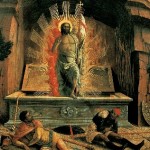 The 3-fold movement of “The Gospel of Suffering” is this:
The 3-fold movement of “The Gospel of Suffering” is this:
- That far from being a sign of God’s non-existence, apathy, or impotence, human suffering is transformed by Christ’s Incarnation into a sign of God’s presence, love, and power.
- That because Christ has become man and suffered to redeem man, suffering is a primary means of participating in God’s nature and being united to Him.
- That as Christians partake of Christ and His suffering, their own suffering is transformed by God into glory and joy.
Here is the 3rd and final part of The Gospel of Suffering:
III. As Christians partake of Christ and His suffering, their own suffering is now not only humiliating and painful but also transformed by God into joy and blessing.
Christ’s suffering, therefore, is a sign of God’s power and love and is a means by which Christians are united to the life of Christ. But the final amazing act of grace has yet to be revealed, for God has promised that those who partake of Christ’s suffering also partake of His glory and joy.
God’s promises to transform suffering into glory and joy are so incredibly wonderful that we might not believe them, had not God clearly revealed them to us in His Word. St. Paul reveals the Gospel of Suffering when he writes: “Not only that, but we rejoice in our sufferings, knowing that suffering produces endurance, and endurance produces character, and character produces hope” (Romans 5:3-4. See also Matthew 5:10; Colossian 1:24, James 1:2-4, and 1 Peter 4:13.)
Having united Himself to His Body, the Church, Jesus Christ continues to live His redemptive life through us. His life, therefore, is the pattern for ours, both individually and corporately. Only after the humiliation of God becoming man, the degradation of being born a helpless infant in a beast’s feeding trough, and the deprivation of suffering and dying, was Christ raised to glory (see Philippians 2.) In fact, it was because Jesus obediently suffered in love that He, in His human nature, was raised to the glory of the Father. “But we see him who for a little while was made lower than the angels, namely Jesus, crowned with glory and honor because of the suffering of death” (Hebrews 2:9).
Perhaps the most beautiful and surprising thing of all is that Christ’s glory and reign began at the very moment when it looked like He was most humiliated and lost: at the Cross. At the Cross, Jesus was raised up and exalted, and the Cross became a Tree of Life. Thus, the Cross is the sum and symbol of God’s transformation of evil into good and suffering into glory.
Since Christians are truly united to Jesus, through suffering, Christians are to live in a state of joy. The suffering doesn’t magically go away, but its meaning and effect in our lives are transformed. What was once humiliating and painful is now joyful and blessed.
How can this be? Because suffering unites us to God, and being united to God is the end of man and the source of all true joy.
Now you know why Paul and Silas were singing for joy at midnight when they sat, mildewing in a Roman jail in Philippi: they knew that they have been counted worthy to partake of Christ’s sufferings. They knew that by their suffering, they were united to their Lord. Now we know why we, too, can rejoice with James in trials and tribulations: by them, we partake of Christ and His nature and character.
We rejoice because suffering is the World’s Greatest Mnemonic Device, which reminds us of God and His goodness. For while we tend to forget God when things are good and hallucinate that we are gods, suffering evaporates our mirages of self and reminds us of who we are. Being deprived, poor, and needy, remind us better than anything else that are, and forever will be, dependent on God and His mercy. Every pang of suffering in your life is God’s reminder to remember Him and turn to Him.
Suffering is also the Angel (“messenger”) of the Lord, announcing that God is very near. If suffering proclaims that we share in the fellowship of Christ’s suffering, it also trumpets that we are truly in the presence of the resurrected, glorified Christ. And, therefore, we rejoice!
It’s no wonder, then, that Christians see God especially in their suffering. It’s no wonder that we often most deeply experience God and His love in our suffering, and not when things appear to be going well.
This Mnemonics of Suffering, as we may call it, is embodied for us in the Eucharist or Lord’s Supper. We remember Jesus Christ every time we partake of Him in His Supper, for the best way to remember someone is to have that Person present before you.
The Lord’s Supper, or Holy Communion, is a partaking of the sacrifice of Christ, including not only His death but also His suffering. But the Holy Communion cannot be a partaking of the suffering and death of Christ without also being a partaking of His Resurrection. Truly partaking of the crucified Christ in the Holy Communion, we receive as well the very life of Christ and are raised to glory with Him. Truly partaking of the Bread of Life and Living Water at the Wedding Feast of the Lamb, we rejoice with exceedingly great joy!
We rejoice because our suffering remind us of the sufferings of others and binds us to them, as Christ has bound Himself to us by His sufferings. Our suffering enables us to sympathize with those who suffer and to seek to bear their burdens in the Name of the suffering Christ. God “comforts us in all our affliction, so that we may be able to comfort those who are in any affliction, with the comfort with which we ourselves are comforted by God. For as we share abundantly in Christ’s sufferings, so through Christ we share abundantly in comfort too,” (2 Corinthians 1:4-5.)
We rejoice, finally, because suffering is the Measure of God and Man. The immense sufferings of Christ are a measure of man’s sins, for with His suffering and death Christ paid for the sins of the whole world. But suffering is also, therefore, a measure of the magnitude of God’s mercy. For as great as our sins are, God’s goodness and love are even greater. Suffering is also a measure of the size of the glory to come. For, St. Paul teaches, “the sufferings of this present time are not worth comparing with the glory that is to be revealed to us” (Romans 8:18).
Far from being a sign of God’s non-existence, apathy, or impotence, human suffering is transformed by Christ’s Incarnation into a sign of God’s presence, love, and power. Because God united Himself in Christ to man and his suffering, suffering is now a means of union with Christ and participating in God’s nature. Because Christians partake of Christ and His suffering, their own suffering is now transformed by God into joy and blessing.
The Resurrection by Mantegna – Public Domain









